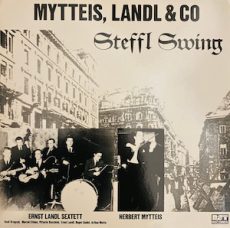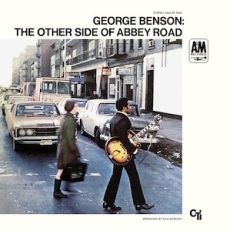
Daily Dose Of Jazz…
Ernst “Nesti” Landl was born February 12, 1914 in Vienna, Austria. He studied at the New Vienna Conservatory in the 1930s and soon made a name for himself on the Viennese music scene.
In Vienna he accompanied the singer Adelaide Hall and was soon active as a musician in North Africa and Portugal. From 1943 he played in the Steffl Diele with Italian singer and guitarist Vittorio Ducchini, violinist Herbert Mytteis and French drummer Arthur Motta. Due to the audience response, recordings were made for Odeon, but due to the ” jazz focus ” there were initially almost no releases.
After the defeat of National Socialism he played in the Vienna Dance Orchestra and also founded the Hot Club Vienna as a studio band to record jazz songs for Elite Special with musicians such as Hans Koller and Viktor Plasil. Until 1958 Landl performed in Vienna mainly as a bar pianist . He then moved to Stockholm, Sweden where he worked until his death.
Pianist, bassist and drummer Ernst Landl died on December 4, 1983 in Stockholm.
More Posts: bandleader,bass,drums,history,instrumental,jazz,music,piano

Daily Dose Of Jazz…
Louiz Banks was born Dambar Bahadur Budaprithi to Nepali parents on February 11, 1941 in Calcutta, West Bengal, British India and grew up in his hometown of Darjeeling. His early music education was at the hands of his father, a trumpeter, and his neighbour Mrs. Myers. He did his schooling at St. Roberts School, Darjeeling and around age thirteen he became interested in western music and he started playing the guitar and the trumpet. His father gave him piano lessons and played in his band. He went to college at St. Joseph’s College in Darjeeling, where he continued to study piano.
After college Banks moved to Kathmandu, Nepal with his father’s band and decided to become a full-time musician, it was there he discovered jazz music. In the late 1960s he had a three year residency at the Soaltee Hotel in Kathmandu. Moving back to Calcutta in 1971 he met singer Pam Craine and saxophonist Braz Gonsalves and formed The Louis Banks Brotherhood. They played hotel rooms and night clubs and he got work composing advertisement jingles and stage musicals.
In 1977 Louiz was in Mumbai with the R.D. Burman troupe and got introduced to world music. Popularizing live jazz he cemented his place and reputation in the city. Two years later along with Goan saxophonist Braz Gonsalves he formed the Indo-Jazz Ensemble, composing music on Indian classical scales and Jazz rhythms, incorporating Indian instruments like ghatam and thavil. In 1980, he was a member of the jazz quartet which was part of the orchestra to perform with Ravi Shankar in his noted suite Jazzmine at the ‘Jazz Yatra’ Festival.
He would go on to form several groups with vocalists, tabla and sitar. In addition he has composed music for several short films. He has performed at various concerts and with well-known jazz artists such as Radha Thomas and Joe Alvares. He worked on a progressive fusion jazz album titled Labyrinth with his son’s band Nexus.
He collaborated as co-producer, arranger and pianist and keyboards on the album Miles From India, a tribute to the founder of modern jazz Miles Davis was nominated for the 2008 Grammy Awards in the Best Contemporary Jazz Album category. In the same category, John McLaughlin’s fusion album Floating Point was also nominated, Banks was the featured keyboardist on the album.
Keyboardist, singer, film composer, record producer Louiz Banks, who has often been acknowledged as the Godfather of Indian Jazz, continues to perform, compose and produce.
More Posts: composer,history,instrumental,jazz,keyboard,music,piano,producer

Daily Dose Of Jazz…
Terry Vosbein was born in New Orleans, Louisiana on February 8, 1957. He received his Masters in Composition from James Madison University and his Doctorate in Composition from the Cleveland Institute of Music. He has composed works for orchestra, wind ensembles, chamber ensembles and choirs. He has written works for jazz bands of all sizes and his compositions have been performed all over the world.
His latest release with the Knoxville Jazz Orchestra is titled Fleet Street and is infused with a sense of humor, adding a special dimension that is too often missing in contemporary big band writing. His 2009 Progressive Jazz album also with the Knoxville Jazz Orchestra has garnered critical acclaim.
He has been awarded seven residencies and a fellowship at University College in Oxford, where he composed Masque for Cello and Orchestra. Terry also teaches music composition at Washington and Lee University in Lexington, Virginia.
For over twenty-five years Vosbein was an active jazz bassist and arranger, performing and arranging for a variety of ensembles, including the Glenn Miller Orchestra and the Atlanta Pops. He has performed in a wide range of genres from country western twang to big band swing, disco and country club wallpaper, and continues to play a never ending assortment of jazz combos and studio sessions.
More Posts: arranger,bandleader,bass,composer,history,instrumental,jazz,music

Daily Dose Of Jazz…
Bernie Glow was born on February 6, 1926 in New York, New York. During the Second World War while attending The High School of Music & Art he played in bands with Stan Getz, Tiny Khan, Shorty Rogers and George Wallington. Early on his influences were Snooky Young with the Jimmie Lunceford band, and Billy Butterfield with Benny Goodman.
At just sixteen and out of high school, Glow spent a year on the road with the Richard Himber Orchestra. Two years later he performed first with Xavier Cugat and then Raymond Scott on CBS radio. At the end of the war he played lead trumpet with the Artie Shaw band. Following that stint, he worked with Boyd Raeburn.
1949 saw the twenty-three year old retiring from the road after more than a year with Woody Herman and his famous Second Herd. Bernie worked as a trumpet player in big bands, Latin bands and dance orchestras. He performed in theaters, dance halls, night clubs and on the radio around Manhattan. This was the final preparation that launched him into the burgeoning commercial and studio scene.
During the last years of the big-band era his first-call studio work included Miles Davis, Frank Sinatra, Ella Fitzgerald and did thousands of radio and television recording sessions. Many of these studio big-band sessions were led by composer/arrangers Nelson Riddle, Quincy Jones and Oliver Nelson.
Trumpeter and sideman Bernie Glow, who played on the seminal Miles Davis and Gil Evans collaborations Miles Ahead, Porgy and Bess, Sketches of Spain, and Quiet Nights, died of a blood disorder in Manhasset, New York at the age of 56 on May 8, 1982.
More Posts: history,instrumental,jazz,music,trumpet

Daily Dose Of Jazz…
Mihály Tabányi was born on February 1, 1921 in Pilis, Hungary. He began his musical studies on the violin at the age of five , and then on the piano at the age of eight. From 1933, he studied accordion for seven years with Lajos Bobula, while attending the Academy of Music and graduating in organ and gordon due to no accordion department. He then became a church organist.
1940 saw Mihály winning first place in the first National Accordion Competition as a professional. Two years later he won the National Accordion King Competition and the Tango Accordion Olympics. He later made his first jazz recordings for the Radiola Electro Record label.
Before 1945, he mainly performed in trios and later with György Cziffra with whom he played in the Bristol Hall orchestra, before founding his own band called Pinocchio that included two guitarists, Elek Bacsik and Attila Zoller, with which he performed in many countries. After 1945, he expanded the trio to eight members. In 1946 he received a contract in Switzerland and two years later he founded his own accordion school. From 1949 he played with his band at the Emke Café for seven years before disbanding in 1956.
In 1950 he was awarded the title of the country’s most popular jazz musician. In 1957 he made the first Hungarian West Coast recording for the Qualiton label. From 1960 he spent years in West Germany and gave concerts in many European countries and made several large formation recordings. He worked with many singers that immortalized his playing on their records. In 2017, the National Accordionist Society established the Mihály Tabányi Award.
Accordionist Mihály Tabányi, who was an Emerton-award winner and the most popular accordionist of the Forties and Fifties, died on July 2, 2019 at the age of 98.
More Posts: accordion,bandleader,history,instrumental,jazz,music


